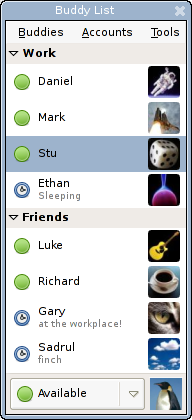 Versie 2.11 van Pidgin is uitgekomen. Dit multiprotocol-instantmessagingprogramma kan overweg met de netwerken van AIM, Bonjour, Gadu-Gadu, Google Talk, Groupwise, ICQ, irc, MSN, MySpaceIM, QQ, Silc, Simple, Sametime, XMPP, Yahoo en Zephyr. Tijdens de installatie kan uit maar liefst zeventig verschillende talen worden gekozen en kan spellingscontrole worden toegevoegd. Binaries zijn beschikbaar voor Windows, maar de broncode kan onder Linux worden gecompileerd. Het programma is ook prima in Gnome en de KDE SC te integreren. De OS X-port wordt uitgebracht onder de naam Adium. De changelog laat de volgende lijst met veranderingen en verbeteringen zien.
Versie 2.11 van Pidgin is uitgekomen. Dit multiprotocol-instantmessagingprogramma kan overweg met de netwerken van AIM, Bonjour, Gadu-Gadu, Google Talk, Groupwise, ICQ, irc, MSN, MySpaceIM, QQ, Silc, Simple, Sametime, XMPP, Yahoo en Zephyr. Tijdens de installatie kan uit maar liefst zeventig verschillende talen worden gekozen en kan spellingscontrole worden toegevoegd. Binaries zijn beschikbaar voor Windows, maar de broncode kan onder Linux worden gecompileerd. Het programma is ook prima in Gnome en de KDE SC te integreren. De OS X-port wordt uitgebracht onder de naam Adium. De changelog laat de volgende lijst met veranderingen en verbeteringen zien.
General:libpurple:
- 2.10.12 was accidentally released with new additions to the API and should have been released as 2.11.0. Unfortunately, we did not catch the mistake until after 2.10.12 was released, but we're fixing it now. See ChangeLog.API for more information.
- Include the Mozilla certificate bundle. This fixes connecting to servers with certificates from Let's Encrypt.
- Remove all 1024-bit CAs
Pidgin:
- media: fix an issue with ximagesink displaying only a corner cut-out of a larger webcam video (Jakub Adam)
- mediamanager: update output window destruction so that it reflects recent changes in the media pipeline structure (Jakub Adam)
- Ported Instantbird's CommandUiOps to libpurple (Dequis)
AIM:
- Fixed #14962
- Fixed alignment of incoming right-to-left messages in protocols that don't support rich text
- Fix a potential crash while exiting pidgin
Windows-Specific Changes:
- Add support for the newer kerberos-based authentication of AIM 8.x
Bonjour
- Use getaddrinfo for DNS to enable IPv6 (#1075)
- Updates to dependencies:
- NSS 3.24 and NSPR 4.12.
ICQ:
- Fixed building on Mac OSX (Patrick Cloke) (#16883)
IRC:
- Stop truncating passwords to 8 characters like old ICQ clients did. (#16692). If you actually needed this, truncate your password manually by pressing backspace a few times.
MXit
- Base64-decode SASL messages before passing to libsasl (#16268)
- Fixed a buffer overflow. Discovered by Yves Younan of Cisco Talos. (TALOS-CAN-0120)
- Fixed a remote out-of-bounds read. Discovered by Yves Younan of Cisco Talos. (TALOS-CAN-0140)
- Fixed a remote out-of-band read. Discovered by Yves Younan of Cisco Talos. (TALOS-CAN-0138, TALOS-CAN-0135)
- Fixed an invalid read. Discovered by Yves Younan of Cisco Talos (TALOS-CAN-0118)
- Fixed a remote buffer overflow vulnerability. Discovered by Yves Younan of Cisco Talos. (TALOS-CAN-0119)
- Fixed an out-of-bounds read discovered by Yves Younan of Cisco Talos. (TALOS-CAN-0123)
- Fixed a directory traversal issue. Discovered by Yves Younan of Cisco Talos (TALOS-CAN-0128)
- Fixed a remote denial of service vulnerability that could result in a null pointer dereference. Discovered by Yves Younan of Cisco Talos. (TALOS-CAN-0133)
- Fixed a remote denial of service that could result in an out-of-bounds read. Discovered by Yves Younan of Cisco Talos (TALOS-CAN-0134)
- Fixed multiple remote buffer overflows. Discovered by Yves Younan of Cisco Talos. (TALOS-CAN-0136)
- Fixed a remote NULL pointer dereference. Discovered by Yves Younan of Cisco Talos (TALOS-CAN-0137)
- Fixed a remote code execution issue discovered by Yves Younan of Cisco Talos. (TALOS-CAN-0142)
- Fixed a remote denial of service vulnerability in contact mood handling. Discovered by Yves Younan of Cisco Talos (TALOS-CAN-0141)
- Fixed a remote out-of-bounds write vulnerability. Discovered by Yves Younan of Cisco Talos. (TALOS-CAN-0139)
- Fix a remote out-of-bounds read. Discovered by Yves Younan of Cisco Talos. (TALOS-CAN-0143)


/i/1196189571.png?f=thumbmedium)